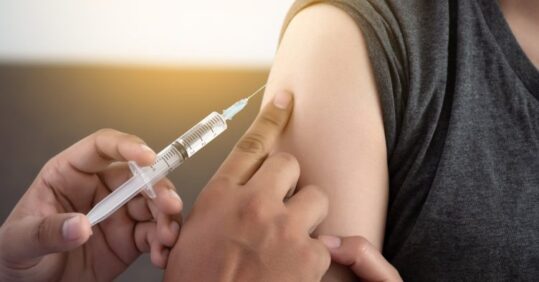HPV vaccine cutting cervical cancer cases by almost 90%, study finds

Girls who receive the human papillomavirus (HPV) vaccine are significantly more protected against cervical cancer, research has found.
The study, published in The Lancet, found rates of cervical cancer in women who had the HPV vaccine between the ages of 12 and 13 were 87% lower than unvaccinated women. And rates were 62% lower in women vaccinated between age 14 to 16, and 34% lower between 16 to 18.
The scientists – from King’s College London, the UK Health Security Agency and the National Cancer Registration and Analysis Service – estimated the programme, which began in 2008, has prevented around 450 cervical cancers and around 17,200 cases of precancerous conditions up to July 2019.
Related Article: Mythbuster: ‘I don’t need a smear test – I’ve had my HPV jab’
Professor Peter Sasieni, lead author from King’s College London, said cervical cancer will become a ‘rare disease’ if ‘most people continue to get the HPV vaccine and go for screening’.
‘We’ve known for many years that HPV vaccination is very effective in preventing particular strains of the virus, but to see the real-life impact of the vaccine has been truly rewarding,’ he added.
Almost all cervical cancers are caused by HPV. But although the HPV vaccine has been proven to reduce HPV infection, this is the first UK study to show it also reduces cases of cervical cancer.
The HPV vaccine protects against the main cancer-causing strains of the virus: HPV 16 and 18. Protecting people against the infection helps to prevent abnormal changes in cervical cells, leading to fewer cases of cervical cancer.
Related Article: Smoking rates fall most significantly in the North of England
Michelle Mitchell, Cancer Research UK chief executive, said the ‘historic’ study shows the ‘HPV vaccine has and will continue to protect thousands of women from developing cervical cancer’.
‘Cancer Research UK has been funding research in this area for many years and we’ve been eagerly awaiting these results since the introduction of the vaccination programme. Around 850 women die from cervical cancer each year in the UK, so we have the chance to save many lives,’ she added.
Dr Vanessa Saliba, Consultant Epidemiologist for UKHSA, said: ‘These remarkable findings confirm that the HPV vaccine saves lives by dramatically reducing cervical cancer rates among women.’
Related Article: Boost your CPD with the redesigned Nursing in Practice 365 platform
The study comes after cervical screening standards were updated for Scotland in August.
To complete relevant cancer women’s health modules on Nursing in Practice Learning, click here.

See how our symptom tool can help you make better sense of patient presentations
Click here to search a symptom




